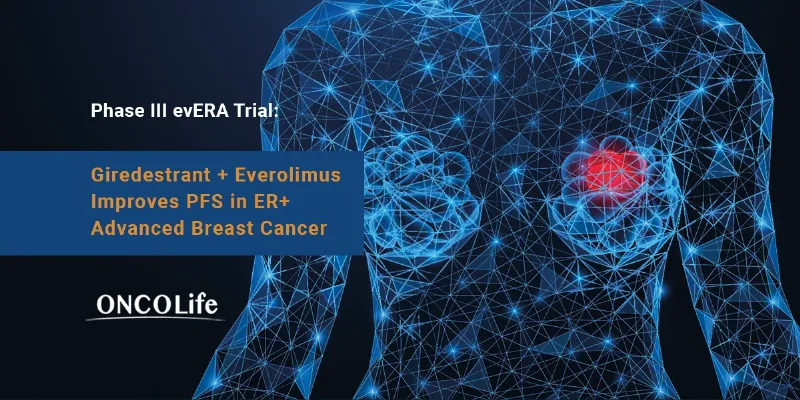Giredestrant Plus Everolimus Improves PF Survival in ER+ Advanced Breast Cancer

26 September 2025
Results from the phase III evERA trial show that giredestrant in combination with everolimus significantly prolonged progression-free survival in ER+, HER2- advanced breast cancer following prior CDK4/6 inhibitor therapy, outperforming standard endocrine therapy. Benefits were observed in both the overall and ESR1+ populations. The all-oral regimen was well tolerated, with no new safety signals reported.
The randomized, open-label, multicenter phase III evERA trial met both co-primary endpoints, confirming a statistically significant and clinically meaningful PFS improvement. Notably, it is the first positive head-to-head phase III study to evaluate an all-oral selective estrogen receptor degrader–based regimen against a standard-of-care combination.
“These results show that the giredestrant combination provided a meaningful benefit for ER-positive breast cancer patients whose disease has progressed following treatment with a CDK inhibitor,” said Levi Garraway, Roche’s Chief Medical Officer and Head of Global Product Development. “We look forward to discussing these results with regulatory authorities.”
Study Design and Outcomes
The evERA Breast Cancer trial (NCT05306340) enrolled patients with estrogen receptor (ER) positive, HER2-negative locally advanced or metastatic disease previously treated with a CDK4/6 inhibitor and endocrine therapy—now the prevailing first-line standard. Participants were randomized to receive either giredestrant plus everolimus or SoC endocrine therapy (including fulvestrant or an aromatase inhibitor) plus everolimus.
The co-primary endpoint was investigator-assessed PFS in both the ITT population and an enriched cohort of patients with ESR1 mutations. Up to 40% of patients in the post-CDK inhibitor setting harbor such mutations, which are associated with poorer outcomes. Secondary endpoints include OS, objective response rate, duration of response, clinical benefit rate, and safety.
The combination demonstrated superior PFS in both patient populations compared with SoC regimens. Roche has not yet disclosed numerical hazard ratios, median PFS values, or subgroup analyses, which are expected at an upcoming scientific meeting.
Safety and Tolerability
The all-oral regimen was generally well tolerated. Adverse events were consistent with the established safety profiles of giredestrant and everolimus, and no new safety signals emerged. The absence of injection-based administration could represent an added advantage for patients managing long-term therapy in advanced disease.
Clinical Context
ER-positive breast cancer accounts for roughly 70% of all breast cancer cases. Although CDK4/6 inhibitors combined with endocrine therapy have transformed first-line management, resistance almost inevitably develops. Post-progression, treatment options remain limited, with outcomes often poor.
Selective estrogen receptor degraders (SERDs) represent a promising therapeutic strategy. Unlike selective estrogen receptor modulators, SERDs both antagonize and degrade the receptor, overcoming some mechanisms of endocrine resistance. Fulvestrant, the first-generation SERD, is limited by its intramuscular route and suboptimal pharmacokinetics. Next-generation oral SERDs, including giredestrant, aim to provide greater receptor suppression and improved patient convenience.
The evERA trial marks the first positive phase III head-to-head study of an all-oral SERD-containing regimen versus a standard-of-care endocrine therapy combination in this setting. Roche plans to present the full evERA data set at an upcoming medical congress and to submit findings to health authorities. The company is also pursuing a broad giredestrant development program spanning adjuvant, endocrine-sensitive, and resistant disease settings, as well as combinations with CDK4/6 inhibitors and HER2-targeted therapy.











Comments
No Comments Yet!